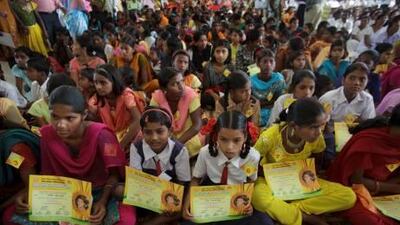SATARA, MAHARASHTRA // When Shivaji Pisar's third child was born, yet another daughter, his parents insisted on naming her Nakusa, "Unwanted" in the local Marathi language.
"I didn't really care what we called her. Three girls is one too many," said Mr Pisar, 37, a shepherd.
Yesterday, however, Nakusa, 5, joined more than 200 other girls in a renaming ceremony in the small town of Satara, 260 kilometres south of Mumbai. During the ceremony, the girls and their parents and guardians took an oath to protect the girls, discourage discrimination and refrain from using names such as Unwanted.
These girls, most named Nakusa or Nakoshi, were handed name-change certificates, allowing them to legally change their names to whatever they wished. A few days before the ceremony, many of them chose to re-register themselves using the names of Bollywood actresses.
The second of six sisters, Nakusa Budhwale, 11, the daughter of a labourer, will now be known as Aishwarya after the Bollywood actress Aishwarya Rai, whose name means "wealth".
"She won a beauty contest. She makes good movies. I like her," she said. "Not everyone can be like her. I want to be."
Most, however, deferred to their parents.
Nakusa Pisar became "Puja," which means worship. Her father remained as ambivalent about the name change as he was about Puja's birth.
"What difference does it make? She does not understand what any of this means," said Mr Pisar.
But Nakusa Kirdat, 32, a primary schoolteacher, knows exactly what it means to grow up rejected by her family. She is the third child and daughter. Her grandmother and mother insisted on calling her Nakusa.
"I felt guilty about who I was all the time. When I used to introduce myself, people used to laugh at me. That is what I most remember - feeling really hurt about my name," said Mrs Kirdat.
That hurt turned her into a determined person, she said, one who resolved to move away and prove to her family that she was not a burden or a curse. She is the only member of her farming family who is a college graduate.
Mrs Kirdat, now the mother of two sons, decided to name herself, Shruti, which means "revelation".
"I always thought that if I had a daughter, I would call her Shruti. I guess I will take that name," she said.
It is a commonly held belief in rural areas such as Satara that to name a girl Unwanted is to jinx her and reject her, said Sudha Kankaria, a women's rights activist in Satara who launched the name-change champaign. By rejecting her you provoke the gods into giving you a son.
Mr Pisar's fourth child was a son.
For the past 25 years, Ms Kankaria has worked in the towns and villages around Satara, helping girls through her NGO, Save the Girl Child. It was during her visits to Satara 2007 that she noticed a spike in the number of girls called Nakusa, or its variations, as well as names such as Dagadi or Dhondi, which means a stone - a burden that weighs down a family.
"The perception was that even if this girl is here, we don't want her and we are going to make sure she is unwanted. It was so cruel, but it was steeped in cultural beliefs," said Ms Kankaria.
These girls, Ms Kankaria said, were more likely to abort if their child was a girl.
"She thinks, 'why should I give my hardships to her', so she aborts," claimed Ms Kankaria.
Female foeticide and infanticide has long been an issue in India. In 1994 the country banned the use of ultrasound to determine gender in an effort to stem the practice. Despite this, the female-to-male ratio continues to widen in India, indicating that the ban is being ignored.
India has a lower than average ratio of females to males compared to most of the world, where the ratio is closer to 50-50. Within India, the state of Maharashtra, where Satara is located, has the largest imbalance: 883 females for every 1,000 males.
Culture and economics drive the preference for boys.
"In the Indian culture, the girl child is seen as a burden for the dowry payment that her parents must pay during her wedding," said Vijayalakshmi Arora, the head of policy and advocacy at the Indian non-profit group Child Rights and You.
In Hindi and other Indian languages, there are aphorisms about an Indian girl child "belonging to someone else", or being the "wealth of someone else", implying that the benefits of any money or education spent on a girl will be enjoyed by the in-laws, Ms Arora said.
Religious belief also is a factor. In Hinduism, it is a deep-rooted belief that a girl cannot cremate her dead parents. Families without male heirs worry that they will have no one to perform the last rites.
That, however, does not excuse the damage inflicted on the psyches of these young women, said Ms Arora. These girls "grow up angry, with a sense of resentment".
Nakusa Patol, 8, certainly knows what it is like to be angry.
Nakusa, renamed Pranila, hated her name because of the bullying at school, where depending on her mood, she would either fight back of bury her head in her arms.
"I am the only girl in school with a terrible name like that," she said. "I am hoping the new name will change everything."
"When she was born, I did not like it," said Geeta Patol, her mother. "We were already burdened with four girls and she was our fifth.
"Now she turns around and asks me, 'Why did you name me like that?'"
Pranila said she will no longer fight or hide when confronted with bullying. "I will pretend I don't know who they are talking about."

